For many expats, living in Madeira offers the best of both worlds: a peaceful island lifestyle paired with the benefits of being part of Portugal and the European Union.
Known for its stunning landscapes and mild climate, Madeira has become an increasingly popular destination for retirees and remote workers. That’s partly thanks to affordable living costs, good infrastructure, and the island’s natural beauty.
In this article, we’ll take a look at why Madeira island is no longer just a holiday spot but also a place to call home for a growing international community and families alike.
You’ll also find out more about:

Living in Madeira means enjoying a lifestyle enriched by stunning natural beauty, mild weather, and a slower pace of life. The island is famous for its mountains, forests, and year-round spring-like climate, making outdoor activities a regular part of daily life.
Residents benefit from a lower cost of living compared to many Western European destinations, along with access to quality healthcare, reliable infrastructure, and a welcoming local community.
For those considering a move, Portugal offers residency options that make Madeira accessible to non-EU citizens.
The Portugal D7 Visa is popular among retirees and individuals with passive income, while the Portugal D8 Digital Nomad Visa is ideal for remote workers who wish to base themselves on the island while continuing to work for employers or clients abroad. For investors, the Madeira Golden Visa is an excellent option.
All three visas provide a pathway to long-term residency and, ultimately, Portuguese citizenship.
The cost of living in Madeira is generally affordable compared to many mainland European countries, though slightly higher than in some regions of mainland Portugal.
Essentials like rent, groceries, and dining out are cheaper than in Lisbon or Porto. That said, certain imported goods such as electronics, brand-name clothing, and packaged foods can make Madeira expensive in some categories.
Average monthly expenses
The cost of living in Madeira is considered generally affordable, especially compared to Lisbon or many other European countries.
According to Numbeo, a single person’s monthly expenses in Funchal (excluding rent) average around €630, while a family of four spends about €2,200. Once rent is included, most expats find that life on the island costs between €1,200 and €1,800 per month for singles, and €2,500 to €3,000 for families, depending on lifestyle.
To give you an idea of what to plan for, here are typical ranges:
- Rent (one-bedroom apartment, Funchal city center): €650–€900
- Rent (one-bedroom apartment, outside center): €450–€700
- Utilities (electricity, water, internet): €100–€150
- Groceries (per person): €200–€300
- Public transport monthly pass: €40–€50
- Dining out (mid-range, per meal): €10–€15
Rent and property costs

Housing is one of the biggest factors in monthly expenses for anyone living in Madeira.
In Funchal, the capital city, the average rent for a one-bedroom apartment in the city center ranges from €650 to €900, while outside the center, it drops to around €450 to €700.
By comparison, the same apartments in Lisbon cost about €1,000 to €1,400 in the center and €750 to €1,100 outside.
Buying property in Madeira is an option for those planning a longer stay since foreigners face no restrictions on property ownership.
Many expats invest in property on the island of Madeira as a holiday home or retirement base. Prices are lower than in Lisbon or Porto, though homes in Funchal and popular areas along the south coast are in higher demand.
Food and daily expenses
When it comes to food, Madeira offers great value if you buy locally. Fresh fruit, vegetables, and seafood are widely available at markets for 20 to 30 percent cheaper than in Lisbon.
A grocery basket for one person usually costs between €200 and €300 per month, while a meal at a mid-range restaurant costs €10 to €15, compared to €15 to €20 in Lisbon.
Dining out is part of the island’s relaxed lifestyle, and you’ll often find locals enjoying espetada (beef skewers), grilled fish, and tropical fruits in neighborhood restaurants.
However, keep in mind that imported goods and specialty packaged items can be more expensive due to shipping from mainland Portugal or other European countries.
Education in Madeira

Families moving to the island have access to public schools, private institutions, and a small but growing number of international schools in Portugal.
The International School of Madeira and the International Sharing School are two of the most recognized options. They offer English-language programs aligned with international curricula.
Public schools are free and follow the Portuguese system, but most teaching is in Portuguese, which can be challenging for children unfamiliar with the foreign language.
For expats seeking smoother integration, international schools balance global education and local community connection.
Healthcare in Madeira
Madeira’s healthcare system is part of Portugal’s national health service, giving residents access to both public healthcare and private clinics. The public system covers essential services and is affordable, though some specialties have long wait times.
Many expats choose private healthcare, which is still reasonably priced compared to other European countries, and offers faster appointments and English-speaking doctors.
Residents are required to register with their local health center once they have a Portuguese address. EU citizens can use their European Health Insurance Card, while non-EU citizens typically need private health insurance until they qualify for residency.
Public transport
Public transport in Madeira is reliable in and around downtown Funchal, with buses connecting the city to surrounding areas.
However, service becomes less frequent in smaller towns or more remote areas, making daily commuting challenging. Living near the capital city is the most practical option for those planning to rely on public transport.
Driving on the island
Most residents find that owning or renting a car gives them far more freedom, especially when exploring the island’s coast, beaches, and nature reserves.
The road network is modern and well-maintained, but narrow mountain roads can intimidate new drivers. Parking in Funchal can also be limited and costly, so many expats prefer to live just outside the city and commute in.
Connections to mainland Portugal
Madeira’s main airport, Cristiano Ronaldo International, connects Funchal to mainland Portugal, other European countries, and occasional long-haul destinations.
Flights to Lisbon are frequent and take about 1.5 hours, making it easy to connect with mainland Europe. The island is also linked to Porto Santo by ferry, offering a convenient way to explore the wider Madeira archipelago.
Choosing the right location is one of the most important parts of moving to Madeira. Each area of the island offers a different lifestyle, from vibrant city living to quiet village life. Here are some of the most popular areas among expats, retirees, and digital nomads.
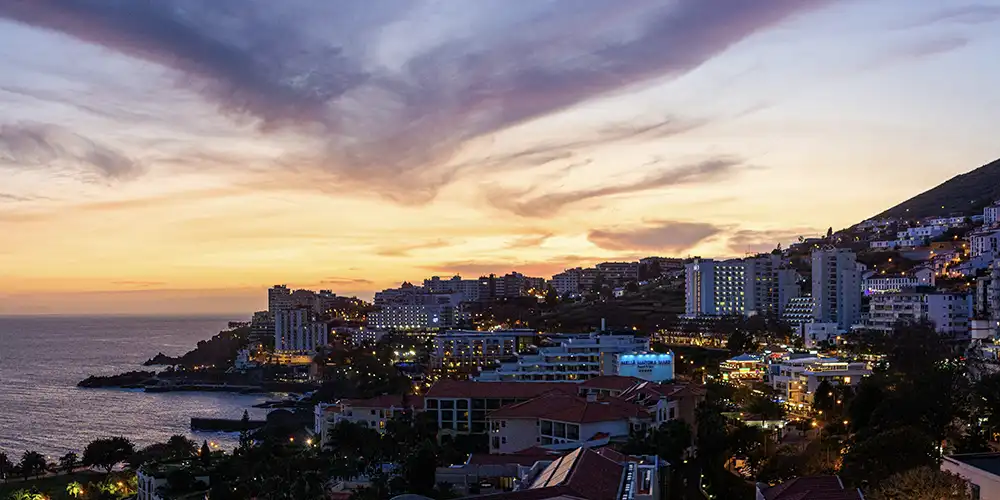
Funchal: Funchal is the capital city and the cultural and economic heart of the island. Living here means easy access to hospitals, international schools, shopping, and entertainment. The downtown Funchal area is lively, with plenty of restaurants, coworking spaces, and a strong international community. Rent is higher than elsewhere on the island, but many expats prefer the convenience and vibrancy of city life.
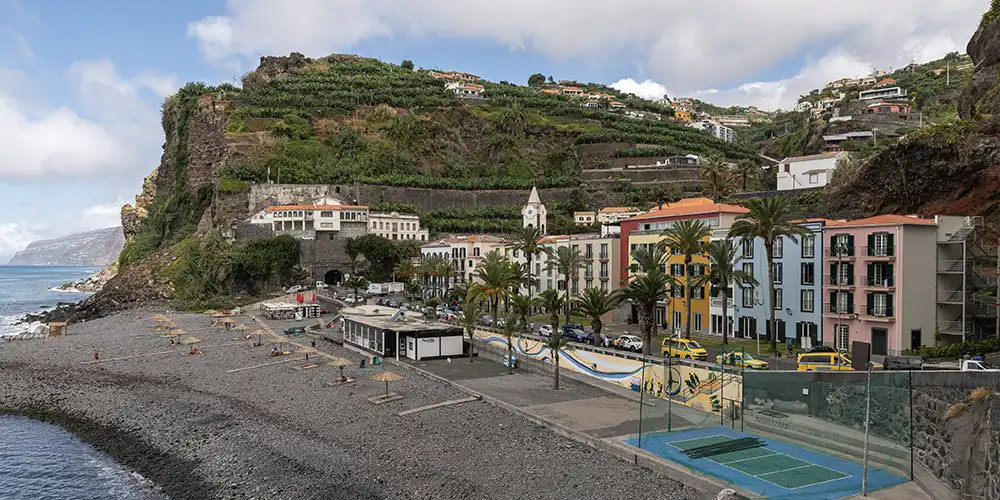
Ponta do Sol – Digital Nomad Hub: On the sunny south coast, Ponta do Sol has become famous as a base for digital nomads thanks to its dedicated remote worker village. It’s known as the sunniest spot on the island and offers a mix of historic charm and modern coworking infrastructure. Ponta do Sol is one of Madeira’s most attractive destinations for expats who want both community and warm weather.
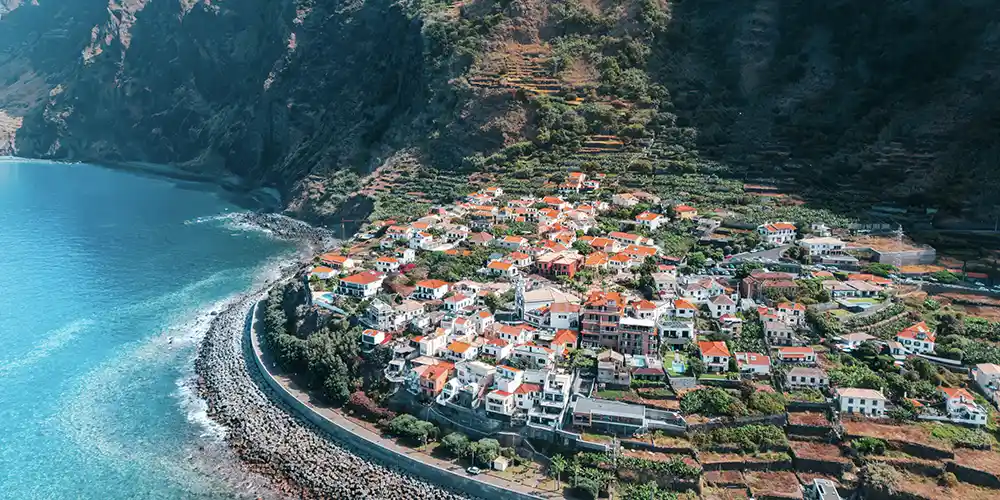
Calheta: Calheta is one of the few areas in Madeira with artificial beaches, making it especially popular with families. The area combines modern apartments, seaside villas, and a marina, while still maintaining a relaxed small-town vibe. Many retirees and families choose Calheta for its mild climate, outdoor lifestyle, and balance of comfort and quiet.
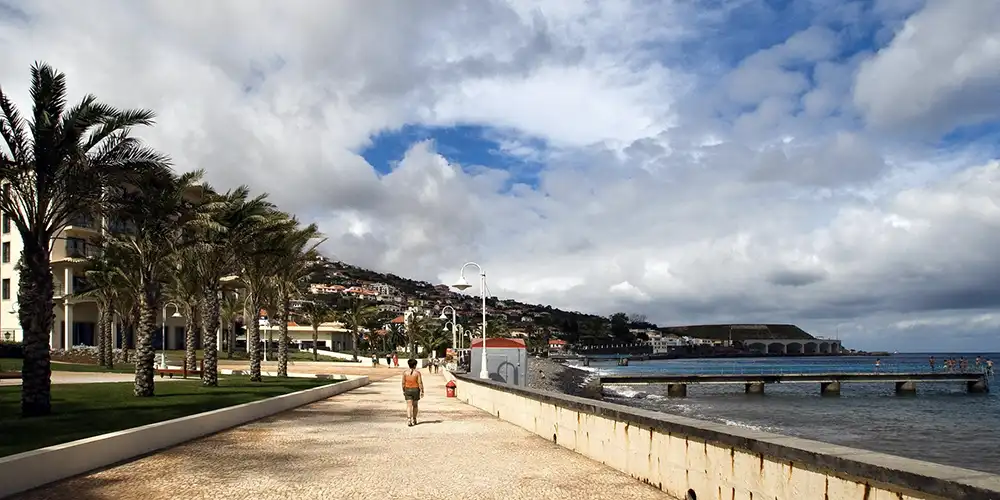
Caniço and Santa Cruz: Located east of Funchal, Caniço and Santa Cruz offer good-value housing, proximity to the airport, and easy access to the capital. Caniço is popular with retirees looking for a calmer pace of life.
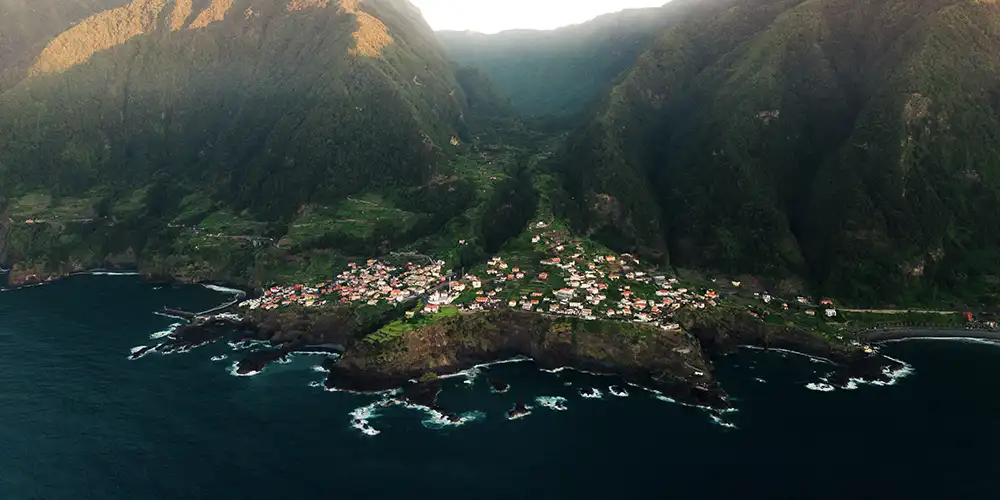
Smaller towns and remote areas: For those seeking a close-knit community and a slower pace, Madeira’s smaller towns and more remote areas provide a very different lifestyle. Places in the north of the island are quieter, surrounded by lush forests, dramatic coastlines, and strong local traditions. Life here is peaceful, though services like public transport and international schools are limited.
Advantages of living in Madeira
1. Subtropical climate and year-round sunshine: Madeira is known for its subtropical climate, with mild winters and warm summers. The weather allows residents to enjoy outdoor activities year-round, whether it’s hiking the levadas (irrigation channels), relaxing by the sea, or exploring lush forests.
2. Strong sense of community and safety: Life on the island often feels more personal and connected than in bigger European countries. Many residents highlight the close-knit community atmosphere, where neighbors know each other and locals welcome newcomers. Add to that the low crime rates, and you’ll find Madeira offers a very safe environment for families, retirees, and solo travelers.
3. Stunning scenery and natural beauty: Living in Madeira means being surrounded by stunning scenery, from dramatic coastlines and volcanic peaks to nature reserves and terraced hillsides. The island’s natural beauty plays a significant role in daily life, with hiking trails, diving, mountain biking and outdoor living forming part of the local culture.
4. Lower cost of living compared to mainland Europe: While some imported goods can be more expensive, the general cost of living is often lower than in many other European countries. Rent, fresh food, and services are generally affordable, especially outside the capital city of Funchal. This balance of affordability and quality of life makes Madeira an attractive destination for expats, retirees, and digital nomads looking for affordable housing.
5. Good food and unique local cuisine: The island offers excellent local cuisine, from fresh seafood and tropical fruits to the famous Madeira wine. Farmers’ markets and local restaurants provide reasonably priced fresh and seasonal food. Many expats say eating out is a highlight of living in Madeira, combining good food with a relaxed lifestyle. There are also several shopping centres.
Disadvantages of Living in Madeira

1. Limited job opportunities outside tourism: While tourism plays a significant role in the local economy, other industries are limited. Unless you work remotely, finding well-paid employment can be difficult. This makes Madeira less suitable for young professionals seeking career growth, unless they are digital nomads with foreign-based work.
2. Higher costs for imported goods: Because Madeira is an island in the Atlantic Ocean, many imported goods—such as electronics, branded clothing, and certain foods—are more expensive. This can make monthly expenses less predictable if you rely heavily on non-local products. For most, it requires some adjustment in spending habits.
3. Remote location from mainland Portugal and Europe: Madeira offers stunning scenery, but its remote location can also feel isolating. Flights to mainland Portugal or other European countries are regular but not always cheap, which can become a significant cost and inconvenience for expats who hope to travel frequently.
4. Public transport limitations: Public transport is available in Funchal and some popular areas, but service in smaller towns or more remote areas can be infrequent. Many residents end up buying or renting a car to get around comfortably. This adds to the overall cost of living on the island, especially for long-term stays.
5. Language barriers and bureaucracy: While many locals speak some English, Portuguese is the main language, and living in Madeira long-term usually requires learning it. Navigating healthcare, legal matters, and local bureaucracy can be challenging if you don’t speak the language well. Expats sometimes find the administrative processes slower than what they’re used to in other European countries.
Why choose Global Citizen Solutions for your Immigration Visa?
GLOBAL APPROACH BY LOCAL EXPERTS
- GCS has offices located across Portugal.
- Members of the US-Portugal and UK-Portugal Chambers of Commerce in Portugal, and the Investment Migration Council (IMC).
- Our expert team can help you throughout your journey to secure your Visa.
100% APPROVAL RATE
- Our successful track record in applications provides reassurance to applicants.
- We have helped clients from more than 35 countries secure residency in Portugal.
ALL-ENCOMPASSING SOLUTION
- With a single channel of communication, our approach ensures that you have complete clarity on your application.
- Our BeGlobal® Onboarding System allows for a total flow of information.
TRANSPARENCY AND PRIVACY
- Our pricing is clear and detailed, you will not face any hidden costs.
- All data is stored within a GDPR-compliant database on a secure SSL-encrypted server.

